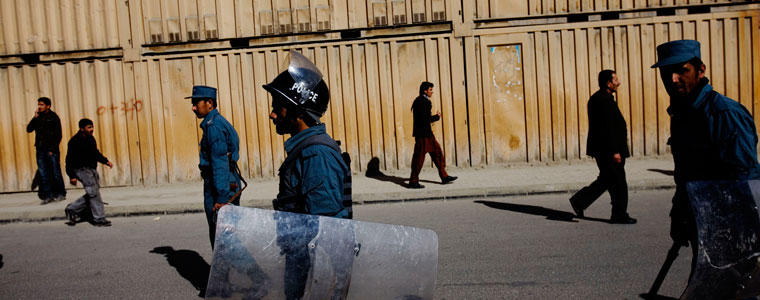Afghan President Hamid Karzai’s signing of a law on two pivotal electoral commissions this week was an important concession to parliament and removed a major obstacle to holding next year’s presidential election on time.

It also indicates that domestic political resistance is strengthening against any maneuvers that might be designed to delay the election, possibly allowing Karzai to stay in office. This would jeopardize a credible political transition that will be critical to securing Afghanistan’s future. Now the political opposition must unify behind a candidate to ensure a credible electoral contest.
Observers have long been skeptical of Karzai’s pledge to step down at the end of his second term in 2014, as the country’s constitution requires. And they’re keeping an increasingly vigilant eye on any steps that might allow him to remain in power, while still retaining a veneer of legality, such as an “unavoidable” delay in the election. Such a scenario could create the need for an interim administration that could be ratified by a Loya Jirga, a traditional Afghan assembly convened to resolve important matters of state.
Recent demonstrations in Karzai’s home province of Kandahar requesting a Loya Jirga to prolong his administration have fed fears that this was his intention. His vetoes of an earlier electoral structures law and another election-related law this spring provided evidence that he might be engineering a postponement.
But Karzai is likely to accept an election if there was no way around it. That depends on significant pressure exerted from within the Afghan elite, which Karzai takes far more seriously than the nostrums of the international community.
For a long time, he faced little resistance. The political opposition mostly has been unable to settle on a candidate to contest the election. Parliament has found it difficult to agree on legislation. And the U.S. has been distracted by other priorities, such as how many troops to leave behind, if any, or whether, when and how to kick-start peace negotiations with the Taliban.
But to the extent that Afghanistan’s political power brokers are represented in its parliament, there are signs that strong – and dare we say it, democratic – momentum is building toward ensuring a credible transition to a new government, starting with the presidential elections currently scheduled for April 2014.
First, the parliament remained in session after the start of Ramadan earlier this month, when they were expected to recess, to deal with urgent pending election-related issues. Both houses were able to agree on revisions to the two pieces of legislation – the law on the elections commission and a board to consider complaints, which Karzai has signed, and a separate electoral law, which he is likely to sign.
Second, the international community has recognized the importance of the elections to their long-term relationship with Afghanistan and has made that point increasingly clear with words and actions. One example was last week’s U.S. Senate Foreign Relations Committee hearing on the importance of the elections. Another example was a high-level meeting of donors in early July that stressed that future aid depended on credible Afghan elections.
Facing this pressure from at home and abroad, Karzai stated he would sign any electoral legislation that was adopted by both houses of parliament. The lawmakers, which have in the past been easily co-opted by the palace, rose to the test and delivered both despite the Ramadan slow-down. Karzai, so far, has kept his word by signing at least one of the two pieces of legislation.
Parliament and the international community have played their role. The political opposition, though, remains in indecision. A coherent opposition, were it to emerge, would represent a constant pressure front against Karzai to keep his constitutional commitments. But they have been unable to agree on a candidate despite a year’s worth of discussions that has become a game of musical chairs where there is always a seat for everyone when the music stops.
The two most convincing apparent candidates that are being talked about (no one has formally declared their candidacy) are Qayum Karzai, the president’s brother, and Abdul Rab Rasul Sayyaf, an influential former mujaheddin commander who generally supports Karzai. The fact that the latter has presented Karzai’s current vice presidents as his potential vice presidents suggests that he also has the endorsement of the president. In other words, both of the most plausible candidates seem to have the backing of the president.
Karzai has yielded to parliament now, but his earlier vetoes cost the electoral process 2 1/2 months of valuable planning time. There will be future opportunities for delay: harsh winter conditions, increasing insecurity and, less likely, a peace deal with the Taliban. The post-April interim administration option remains open despite his concession on legislation.
But that concession indicates that Karzai will yield to concerted domestic political pressure. Elections will only happen if that pressure, backed by the international community, continues. And Afghanistan’s future political stability can best be assured if the elections happen. We are, at least, one step closer. The question remains: where is the opposition?
Scott Smith is deputy director of Afghanistan programs at USIP.



